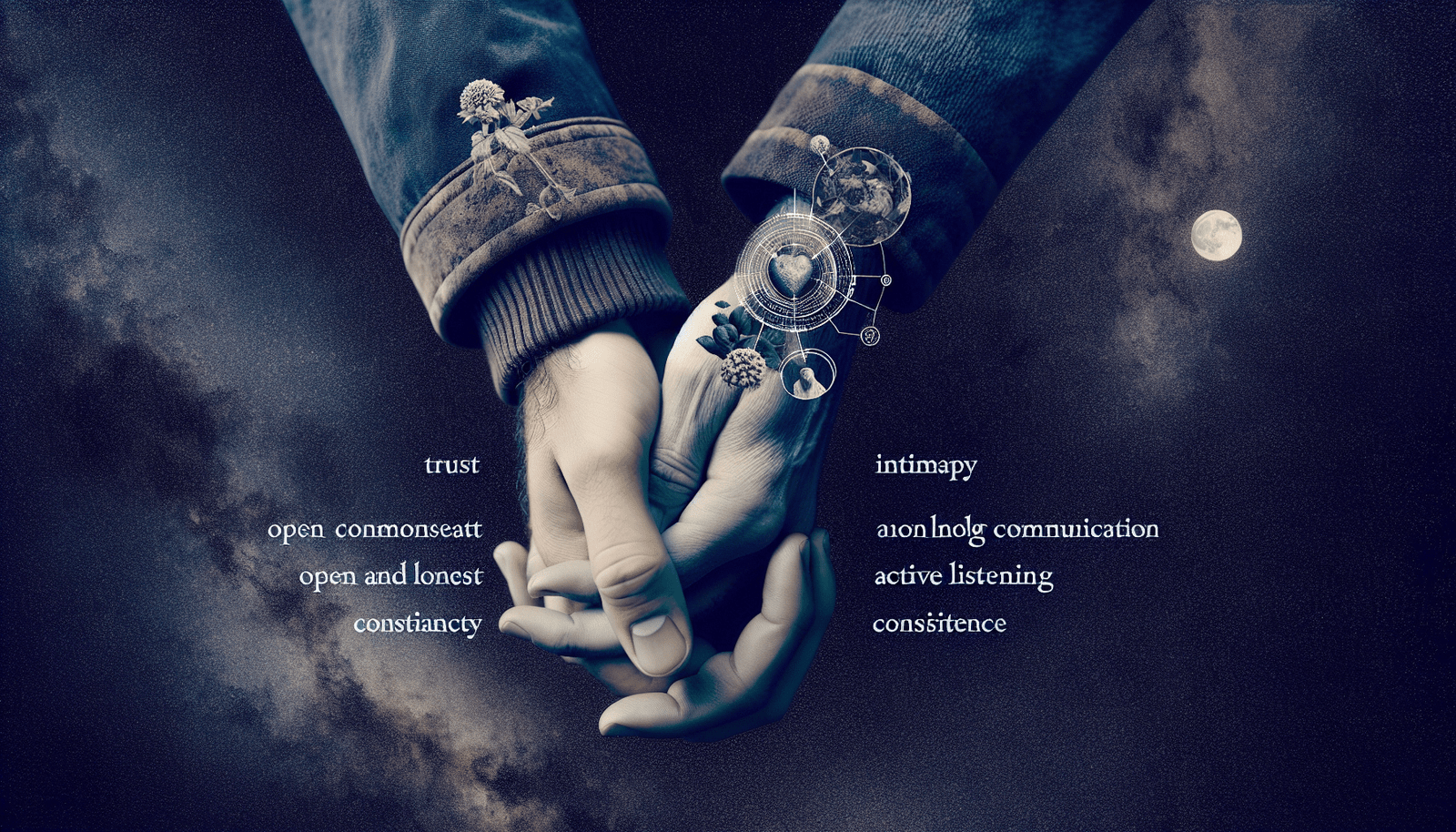Long-Term Relationships
Imagine having a loyal companion by your side, someone who understands you better than anyone else. That’s what long-term relationships are all about. In this article, we will explore the depth and beauty of these enduring connections. From the ups and downs to the lessons learned along the way, we will celebrate the power of love, friendship, and commitment. So buckle up and get ready for an enlightening journey into the world of long-term relationships.
Building a Strong Foundation
Effective Communication
Effective communication is a crucial aspect of building a strong foundation in any long-term relationship. It involves actively listening to your partner, expressing your thoughts and feelings honestly and respectfully, and being open to feedback. Good communication allows you to understand each other better, resolve conflicts, and strengthen your connection. It is important to create a safe space where both partners feel comfortable expressing themselves without fear of judgment or criticism. By practicing effective communication, you can foster trust, understanding, and intimacy in your relationship.
Trust and Honesty
Trust and honesty go hand in hand in a healthy and fulfilling long-term relationship. Trust is the foundation on which a strong partnership is built, and it requires ongoing effort to maintain. It involves being reliable, keeping promises, and being transparent with your partner. Being honest with one another, even during difficult or uncomfortable conversations, helps build trust and ensures that both partners are on the same page. Trust enables you to feel secure in your relationship, knowing that your partner has your best interests at heart.
Shared Values and Goals
Having shared values and goals can strengthen the bond between partners in a long-term relationship. It is important to align your values and ensure that you have common interests, beliefs, and aspirations. When you share similar values and goals, it becomes easier to make decisions together and support each other in pursuing your dreams. This common foundation creates a sense of unity and purpose, fostering a deeper connection and understanding between partners.
Support and Encouragement
Support and encouragement play a vital role in maintaining a strong foundation in a long-term relationship. Being there for your partner during both triumphs and challenges is crucial. By offering support, you show your partner that you are their biggest cheerleader and that you believe in their capabilities. It is important to provide encouragement when they are facing obstacles or pursuing their goals. Supporting and encouraging each other fosters a sense of partnership, builds resilience within the relationship, and strengthens the bond between partners.
Maintaining Intimacy
Quality Time Together
Maintaining intimacy requires investing quality time in your relationship. Make it a priority to spend time together, free from distractions, where you can focus solely on each other. Whether it’s going on dates, taking walks, or engaging in shared hobbies, dedicating quality time allows you to deepen your connection and create lasting memories. Disconnect from technology and actively engage with your partner, listen attentively, and show genuine interest in their thoughts and experiences. Quality time together strengthens emotional intimacy and renews the bond between partners.
Physical Affection
Physical affection is an important aspect of maintaining intimacy in a long-term relationship. Simple gestures like holding hands, hugging, kissing, and cuddling can convey love, warmth, and closeness. Physical touch releases feel-good hormones, creating a sense of comfort and security. Make an effort to incorporate physical affection into your daily lives, even during busy or stressful times. It serves as a reminder of your love and affection for each other and fosters a deeper level of intimacy.
Emotional Connection
Emotional connection is a key component of maintaining intimacy. It involves being attuned to your partner’s emotions and responding with empathy and understanding. Take the time to have meaningful conversations, share your thoughts and feelings, and truly listen to your partner’s perspective. Show compassion and validate their emotions, creating a safe space for vulnerability and openness. By nurturing emotional connection, you deepen your understanding of each other, enhance trust, and strengthen the intimacy in your relationship.
Sexual Satisfaction
Sexual satisfaction is an integral part of maintaining intimacy in a long-term relationship. Open and honest communication about desires, boundaries, and preferences is crucial to ensure both partners feel fulfilled and satisfied. Explore each other’s needs and desires, and be receptive to trying new things that mutually excite you both. It is important to prioritize each other’s pleasure and maintain a healthy and mutually fulfilling sexual relationship. Regular intimacy fosters a deep emotional and physical connection, bringing partners closer together.
Conflict Resolution
Open and Respectful Communication
Conflict is inevitable in any long-term relationship, but it is how you handle it that matters. Open and respectful communication is essential for effective conflict resolution. When conflicts arise, approach them with a willingness to listen and understand your partner’s perspective. Avoid blaming or criticizing, and instead focus on expressing your own feelings and needs. Use “I” statements to avoid sounding accusatory and create a safe environment for open dialogue. By communicating openly and respectfully, you can work together to find resolutions and strengthen your bond.
Active Listening
Active listening is a fundamental skill in resolving conflicts. It involves giving your partner your full attention, truly hearing what they have to say, and responding with empathy and understanding. Practice active listening by avoiding interrupting, providing non-verbal cues that show you are engaged, and summarizing what your partner has said to ensure you have understood correctly. By actively listening, you demonstrate your commitment to understanding your partner’s perspective and promote more effective communication and conflict resolution.
Compromise and Collaboration
In any long-term relationship, compromise and collaboration are essential when conflicts arise. It’s important to find middle ground and seek solutions that satisfy both partners. This involves considering each other’s needs and finding ways to meet them without sacrificing your own. Through collaboration, you can brainstorm together and explore creative solutions that address both partners’ concerns. Compromise demonstrates a willingness to prioritize the relationship over individual desires, fostering a sense of unity and teamwork.
Seeking Professional Help if Needed
Sometimes, conflicts in a long-term relationship may require the assistance of a professional. Seeking the help of a couples therapist or counselor can provide valuable guidance and support. A trained professional can offer unbiased advice, teach effective communication techniques, and facilitate a safe space for deeper exploration of relationship issues. Don’t hesitate to reach out for professional help if you and your partner find yourselves stuck in recurring conflicts or struggling to find resolutions on your own. Seeking professional help demonstrates a commitment to the health and longevity of your relationship.
Keeping the Flame Alive
Surprise Dates or Getaways
To keep the flame alive in a long-term relationship, surprise your partner with special dates or getaways. Plan spontaneous outings or trips to break the routine of daily life and create new shared experiences. Surprise dates or getaways help rejuvenate the relationship, allowing you to reconnect and discover new sides of each other. It’s an opportunity to create cherished memories and reinforce the sense of adventure and excitement within your connection.
Spontaneity and Adventure
Spontaneity and adventure are essential in maintaining a vibrant and passionate relationship. Embrace the element of surprise and be open to stepping outside of your comfort zones together. Try new activities, explore new places, and embrace spontaneity to inject excitement into your lives. By infusing your relationship with adventure, you keep the flame alive, create a sense of exhilaration, and continuously deepen your bond.
Continued Learning and Personal Growth
Continued learning and personal growth contribute to the longevity and vitality of a long-term relationship. Encourage each other to pursue individual interests, take on new challenges, and engage in personal development. By nurturing personal growth, you remain interesting and dynamic as individuals, bringing new perspectives and experiences into your relationship. Support each other’s endeavors and celebrate the achievements and growth, fostering a sense of pride and admiration.
Expressing Appreciation and Love
Expressing appreciation and love is vital in keeping the flame alive. Regularly articulate your love and admiration for your partner, acknowledging their efforts and qualities that you value. Show gratitude for the little things they do and express how they enhance your life. Small gestures of affection, such as writing love notes or leaving surprise tokens of affection, reinforce the love and connection between partners. By consistently expressing appreciation and love, you nurture a deep emotional connection and keep the flame burning bright.
Nurturing Independence
Maintaining Individual Hobbies and Interests
Nurturing independence in a long-term relationship involves maintaining individual hobbies and interests. Each partner should have activities that they enjoy and pursue independently from the relationship. This allows for personal growth and self-fulfillment, which ultimately benefits the partnership. Encourage each other to explore passions and continue engaging in activities that bring joy and fulfillment. Supporting each other’s individual pursuits fosters independence, self-confidence, and a sense of fulfillment within the relationship.
Encouraging Personal Goals
Encouraging personal goals is an important part of nurturing independence. Each partner should have their own aspirations and dreams, which deserve support and encouragement. Take an active interest in each other’s goals and offer support in achieving them. Celebrate achievements together and provide a safe space to discuss challenges and brainstorm strategies. Encouraging personal goals fosters a sense of autonomy and self-worth, while also strengthening the bond between partners.
Respecting Boundaries
Respecting boundaries is crucial in nurturing independence within a long-term relationship. Each partner should have their own personal space and boundaries that need to be acknowledged and respected. Communicate openly about boundaries and ensure that both partners feel comfortable asserting their needs. By respecting each other’s boundaries, you create an environment of trust and mutual respect, which fosters individual growth and strengthens the foundation of the relationship.
Supporting Self-Care
Supporting self-care is essential in promoting independence and well-being within a long-term relationship. Encourage and actively participate in self-care practices that prioritize physical, mental, and emotional well-being. This may include exercise routines, hobbies, meditation, or seeking therapy when needed. By prioritizing self-care, you demonstrate a commitment to individual happiness and foster a healthier and more balanced partnership.
Shared Responsibilities
Division of Household Chores
Shared responsibilities in a long-term relationship involve the division of household chores. Both partners should contribute to maintaining a clean and organized living space. Discuss and allocate specific responsibilities, ensuring that both partners feel that the workload is distributed fairly. Regularly reassess and adjust the chore division to accommodate changing circumstances. Shared responsibilities create a sense of equity and teamwork within the relationship, reducing stress and fostering a harmonious home environment.
Financial Management
Financial management is an important aspect of shared responsibilities in a long-term relationship. Collaborate on budgeting, saving, and making financial decisions together. Establish open and honest communication around money, discussing individual financial goals and priorities. By working together to manage finances, you create a sense of financial security and build a stronger foundation for your future.
Childcare and Parenting
If you have children, childcare and parenting responsibilities are integral to maintaining a balanced and fulfilling long-term relationship. Share the responsibilities of caring for children, including daily routines, decision-making, and disciplining. It is crucial to communicate openly about parenting styles and align strategies to provide consistency. Supporting each other in parenting fosters a sense of teamwork and strengthens the family unit.
Supporting Each Other’s Careers
Supporting each other’s careers is important in a long-term relationship. Encourage and advocate for each other’s professional growth and success. Discuss career aspirations, provide guidance, and celebrate achievements together. By supporting each other in careers, you create a sense of partnership and ensure that both partners feel valued and fulfilled.
Celebrate Milestones Together
Anniversaries
Celebrating anniversaries is a special way to mark the milestones in your relationship. Take the time to commemorate the day you committed to each other and reflect on your journey together. Plan meaningful activities or surprises to honor the occasion, whether it’s a romantic dinner, a weekend getaway, or a heartfelt gift. Celebrating anniversaries reaffirms your love and commitment to each other and serves as a reminder of the strength of your partnership.
Birthdays
Birthdays are important opportunities to celebrate and appreciate each other. Make your partner’s birthday a day filled with love and joy. Plan surprises, create personalized gifts, or organize a gathering with loved ones to commemorate their special day. Celebrating birthdays allows you to express your love and gratitude for your partner, making them feel cherished and appreciated.
Holidays and Festivals
Embracing holidays and festivals together is a beautiful way to create traditions and build memories. Whether it’s celebrating religious holidays, cultural festivals, or national events, find ways to honor and enjoy these occasions together. Participate in traditions, decorate your home, and engage in activities that are meaningful to both of you. Celebrating holidays and festivals strengthens cultural connections and enhances the joy and togetherness in your relationship.
Personal Achievements
Celebrate personal achievements and milestones in each other’s lives. From promotions at work to personal goals achieved, take the time to honor and acknowledge these accomplishments. Show support and pride in your partner’s achievements by planning a celebration or simply expressing genuine admiration. Celebrating personal achievements strengthens the bond between partners and reinforces the belief in each other’s abilities.
Balancing Work and Relationship
Setting Priorities
Balancing work and the relationship requires setting priorities. Clearly define what is most important to both of you and make intentional decisions based on those priorities. Remember that while work is important, the relationship also deserves attention and nurturing. Be mindful of dedicating time and energy to your partner, and communicate openly about how to navigate the demands of work while still maintaining a strong connection.
Effective Time Management
Effective time management is essential for balancing work and the relationship. Find ways to optimize your time and create a balance between work commitments and quality time with your partner. Set aside specific periods for uninterrupted quality time and create boundaries to limit work-related distractions. By managing your time effectively, you can ensure that both work and the relationship receive the attention they deserve.
Open Communication about Work Stress
Open communication about work stress is crucial in maintaining a healthy work-life balance. Share your concerns, frustrations, and challenges with your partner, allowing them to offer support and understanding. Be receptive to their input and help in finding solutions to manage work-related stress effectively. By communicating openly, you can create a supportive environment where both partners feel heard and supported.
Creating Work-Life Balance
Creating work-life balance involves finding ways to integrate work and personal life harmoniously. Set boundaries between work and personal time, ensuring that each aspect receives adequate attention. Prioritize self-care, quality time together, and engage in activities that bring joy and relaxation. Creating work-life balance promotes overall well-being and strengthens the bond between partners.
Adapting to Change
Supporting Each Other in Life Transitions
Adapting to change requires supporting each other during life transitions. Whether it’s a career change, relocation, or a major life event, be there for your partner as they navigate through transitions. Offer emotional support, provide reassurance, and communicate openly about any concerns or fears. By supporting each other in life transitions, you strengthen your bond and build resilience within the relationship.
Effective Problem-Solving Skills
Effective problem-solving skills are essential in adapting to change. Approach challenges as a team and work together to find solutions. Take a proactive stance, identifying potential obstacles and brainstorming strategies. Effective problem-solving helps navigate through transitions smoothly, reducing stress and fostering a stronger connection.
Flexibility and Adaptability
Flexibility and adaptability are key traits when faced with change. Embrace the uncertainties that come with life and be open to adjusting plans or expectations. Practice acceptance and seek opportunities for personal growth during periods of change. By being flexible and adaptable, you create an environment that fosters resilience and strengthens the relationship.
Maintaining a Positive Outlook
Maintaining a positive outlook is crucial when adapting to change. Choose to focus on the opportunities and possibilities that change brings rather than dwelling on the challenges. Practice gratitude and optimism, looking for the silver linings in every situation. By maintaining a positive outlook, you create an environment of hope and optimism, which cultivates a thriving and resilient relationship.
Seeking Relationship Help
Couples Therapy
Seeking couples therapy is a proactive step in maintaining a healthy long-term relationship. Couples therapy provides a neutral and safe space to explore and address any concerns or challenges within the relationship. A therapist can offer guidance, tools, and techniques to improve communication, resolve conflicts, and deepen the bond between partners. Couples therapy is an investment in the well-being of the relationship and the growth of both individuals.
Relationship Workshops or Retreats
Participating in relationship workshops or retreats is a great way to invest in your long-term relationship. These programs provide opportunities to learn new skills, gain insights from experts, and connect with other couples who are on a similar journey. Workshops or retreats create an immersive experience that allows for deeper exploration and growth within the relationship.
Online Resources and Books
Online resources and books offer a wealth of information and guidance on various aspects of relationships. There are numerous websites, podcasts, and blogs that provide advice and tools for maintaining a healthy partnership. Additionally, books written by relationship experts can offer valuable insights and strategies. Utilize these resources to continue learning and growing together.
Seeking Advice from Trusted Friends or Family
Seeking advice from trusted friends or family members who have successful long-term relationships can provide additional perspectives and support. Discussing concerns or seeking insight from those who know you well and have your best interests at heart can offer valuable guidance. Be selective about who you seek advice from, ensuring that they have a healthy and thriving relationship themselves.
In conclusion, building and maintaining a strong and fulfilling long-term relationship requires effort, commitment, and continuous growth. Effective communication, trust and honesty, shared values and goals, support and encouragement, maintaining intimacy, resolving conflicts, nurturing independence, sharing responsibilities, celebrating milestones, balancing work and the relationship, adapting to change, and seeking help when needed are all essential elements in creating a solid foundation for a lasting and thriving partnership. By implementing and nurturing these practices, you can cultivate a relationship that withstands the test of time and brings joy, fulfillment, and love into your lives.






